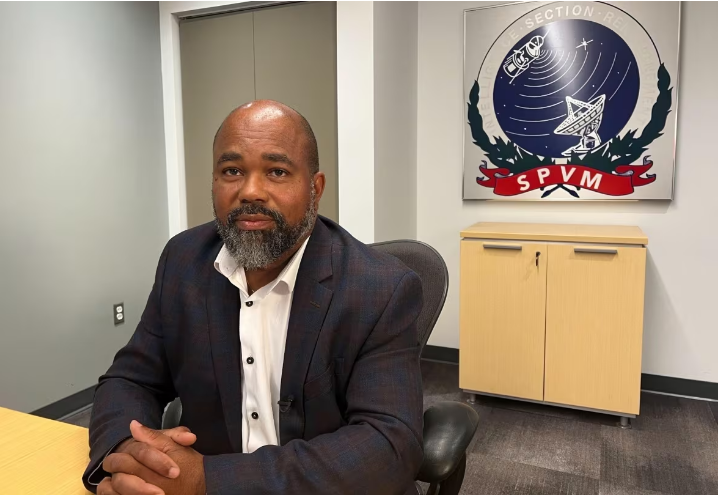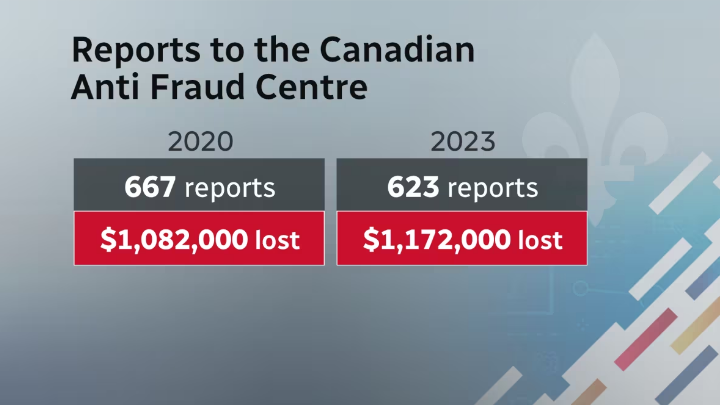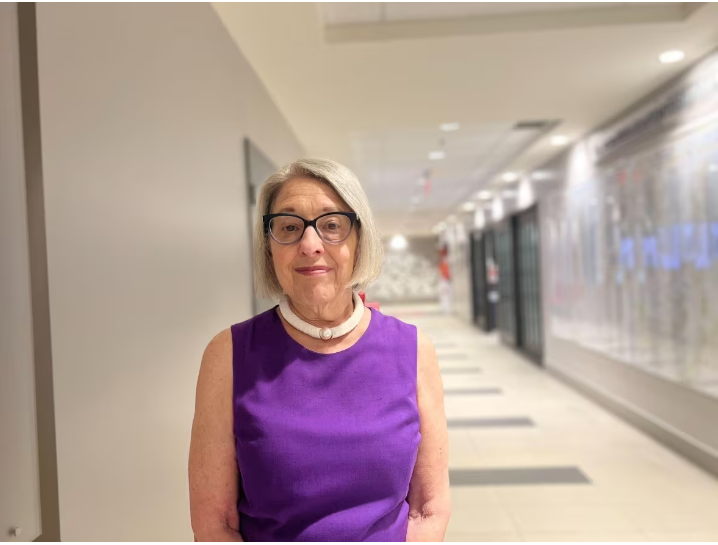
Daphne Nahmiash, president of the non-profit Handicap-Vie-Dignité, says these scams target the most vulnerable. (Chloë Ranaldi/CBC)
Daphne Nahmiash knows first-hand that scammers are betting on their targets not stopping to think about what might really be going on.
She’s received calls from people impersonating someone else asking for money. And she says friends have fallen for some of these sophisticated scams that prey on the elderly.
The seniors’ rights advocate says when it comes to the well-being of their family, rational thinking fails.
“You’re not really so logical,” she said. “When people are calling you, you don’t really have the ability to stop to think clearly.”
These schemes include the so-called “grandparent scam,” where a senior receives a call or text messages saying a loved one is in desperate need of cash. They pretend to be a police officer, lawyer or even a younger family member.
As police and fraud-prevention experts see a rise in these kinds of scams, more resources are being created to help seniors spot them — and to break down any stigma around reporting the crime.
Montreal police say fraudsters have become more sophisticated in recent years.
And Clive Olivier, an agent with the police service’s fraud department, says these people usually pressure potential victims to act quickly.

Clive Olivier with the Montreal police says a person’s bank account can be drained within minutes while they’re still speaking with a fraudster. (Chloë Ranaldi/CBC)
He says callers sometimes claim that accounts have already been compromised — and ask for a person’s credit card number to cancel the card, or for verification purposes.
Olivier says a fraudster might send someone else to pick up the card from the victim while they’re still on the call. Or the scammer might even drive the victim to their bank so that they withdraw cash, instructing them what to say at the branch.
He says seniors are especially vulnerable to these scams.
“We saw an increase in 2022. It more than doubled compared to the cases in 2021,” he said, adding they’re seeing similar numbers so far this year.

In 2020, 667 reports were made for a total loss of just over $1 million in Quebec. So far this year, 623 reports were made for a total of $1.17 million lost. (CBC)
Data from the Canadian Anti-Fraud Centre shows that the amount of money lost in Quebec has grown in recent years.
“If the fraudulent call is recent, we’ll try to get information,” said Olivier. “We will warn them if they call them back to call us immediately.… And we can get involved to try to catch them.”
He encourages victims to report the crime to police. But Nahmiash says many are hesitant to do so — even after losing the savings they’re depending on to live.
“It’s embarrassing to think it happened to you,” she said. “You do feel ashamed and feel terrible that you weren’t smart enough to say no or prevent it.”
The Cummings Centre is working to raise awareness about these schemes.
The non-profit organization that serves seniors in western Montreal has been getting requests from members for tools to spot the grandparent scam.
Since 2021, they’ve held seminars on grandparent scams and other misleading calls.

Linda Shohet is a member of the social action committee at the Cummings Centre. (Chloë Ranaldi/CBC)
Linda Shohet, member of the centre’s social action committee, says their first virtual session had an “overwhelming” response, where nearly 700 people logged on.
Shohet wants people to know that they aren’t alone and scams could happen to anyone.
“Our main goal is to inform people,” she said. They want people to know what kinds of scams are out there, and “signals [to] look for and hear that say step back, hang up and ask questions.”
The centre is now developing seminars for the fall, based on demand and the most pressing concerns from its members.
In recent years, the rise of complex scams targeting seniors has become a cause for concern in Montreal, Canada. Elderly individuals, often more trusting and less technologically savvy, have become prime targets for fraudsters seeking to exploit their vulnerabilities. These scams encompass a wide range of tactics, including identity theft, telemarketing fraud, and financial exploitation. This article delves into the intricate world of scams targeting seniors in Montreal, highlighting the efforts made by various individuals and organizations to combat this growing problem.
As the elderly population grows, so does their vulnerability to scams. Factors such as loneliness, cognitive decline, and limited financial literacy make seniors particularly susceptible to manipulation. Scammers prey on these vulnerabilities, using sophisticated techniques to gain the trust of their victims. By understanding the unique challenges faced by seniors, we can better address the issue and protect this vulnerable population.
Identity theft is one of the common scams targeting seniors. Scammers steal personal information, such as Social Insurance Numbers or banking details, to assume the identities of unsuspecting seniors. They then use this information to commit various forms of fraud, leaving victims with significant financial and emotional distress.
Telemarketing fraud is another prevalent tactic used by scammers. They employ persuasive tactics over the phone to deceive seniors into providing sensitive information or making payments for bogus products or services. These scams often involve high-pressure tactics and false claims, leaving victims financially devastated.
Financial exploitation is yet another alarming scam targeting seniors. Fraudsters manipulate seniors’ trust to gain control over their finances. They may pose as caregivers, friends, or even family members to gain access to bank accounts, investments, or valuable assets. Once in control, they drain the victims’ resources, leaving them financially devastated and vulnerable.
Romance scams are particularly heartbreaking. Scammers use online dating platforms to build relationships with vulnerable seniors, gaining their trust and affection. Eventually, they exploit their victims financially, often by concocting elaborate stories to solicit money for supposed emergencies or investments.
In response to these scams, various individuals and organizations in Montreal have taken proactive measures to combat the issue. Public awareness campaigns play a crucial role in educating seniors about the different types of scams targeting them. These initiatives provide valuable information on recognizing red flags and offer tips to stay safe.
Financial institutions in Montreal have also joined the fight against senior scams. They have implemented safeguards, such as enhanced fraud detection systems and staff training programs, to identify and prevent fraudulent activities targeting their elderly customers.
Law enforcement agencies, including the police and the Royal Canadian Mounted Police (RCMP), have established specialized units to investigate and prosecute scammers targeting seniors. These units work closely with other organizations to gather intelligence, identify fraud networks, and bring the culprits to justice.
Community-based organizations and support networks have emerged as lifelines for seniors affected by scams. They provide resources, workshops, and counseling services, offering emotional support and guidance to victims of scams. These networks also facilitate communication between victims, empowering them to share their experiences and learn from one another.
To safeguard against complex scams targeting seniors and protect Montreal’s vulnerable population, it is essential to take proactive measures. Here are some key strategies to promote safety:
Education and Awareness: Implement comprehensive public awareness campaigns to educate seniors about the various types of scams and the tactics used by fraudsters. Provide information on how to recognize warning signs, protect personal information, and respond to suspicious requests. Conduct workshops, seminars, and community events to disseminate this knowledge widely.
Financial Literacy Programs: Offer specialized financial literacy programs for seniors, focusing on basic money management, understanding financial products and services, and recognizing potential scams. Collaborate with local financial institutions and non-profit organizations to provide resources and workshops tailored to the needs of seniors.
Strengthen Communication Networks: Establish effective communication channels to disseminate timely information about emerging scams. Partner with local media outlets to raise awareness through news articles, interviews, and public service announcements. Utilize digital platforms, social media, and community newsletters to reach a wider audience.
Collaboration with Financial Institutions: Forge partnerships with banks, credit unions, and other financial institutions to enhance fraud detection and prevention efforts. Encourage these institutions to implement robust security measures, conduct regular staff training on identifying and reporting suspicious activities, and provide dedicated support for seniors.
Technology Education: Offer technology training programs specifically designed for seniors to enhance their digital literacy. Teach them about safe online practices, including recognizing phishing attempts, creating strong passwords, and using secure online platforms. Provide guidance on social media privacy settings and the potential risks associated with sharing personal information online.
Support Networks and Helplines: Strengthen existing support networks for seniors by collaborating with community organizations, helplines, and senior centers. Ensure that seniors have access to counseling services, legal assistance, and resources to navigate scams effectively. Establish helplines or hotlines dedicated to assisting seniors in reporting scams and seeking guidance.
Collaboration with Law Enforcement: Foster collaboration between local law enforcement agencies, such as the police and the RCMP, to ensure swift action against scammers. Establish specialized units or task forces that focus on investigating and prosecuting those involved in targeting seniors. Encourage seniors to report scams promptly and provide them with information on how to contact relevant authorities.
Empowerment and Peer Support: Create platforms for seniors to share their experiences, learn from one another, and provide mutual support. Facilitate support groups, workshops, and discussion forums where seniors can discuss scams, share strategies, and build a strong support network.
Family and Caregiver Engagement: Engage family members, caregivers, and friends in the fight against senior scams. Encourage open dialogue about scams and provide them with resources to assist seniors in recognizing and avoiding potential scams. Emphasize the importance of maintaining regular communication with elderly loved ones and being vigilant about their financial affairs.
Legislative Measures: Advocate for stronger legislation and regulations to combat scams targeting seniors. Work with policymakers to introduce stricter penalties for scammers, enhance consumer protection laws, and improve reporting mechanisms for fraudulent activities.
By implementing these strategies, Montreal can work towards creating a safer environment for seniors and protect them from complex scams. The collaborative efforts of individuals, organizations, and the wider community are crucial in the ongoing fight against fraudsters who target vulnerable populations.

